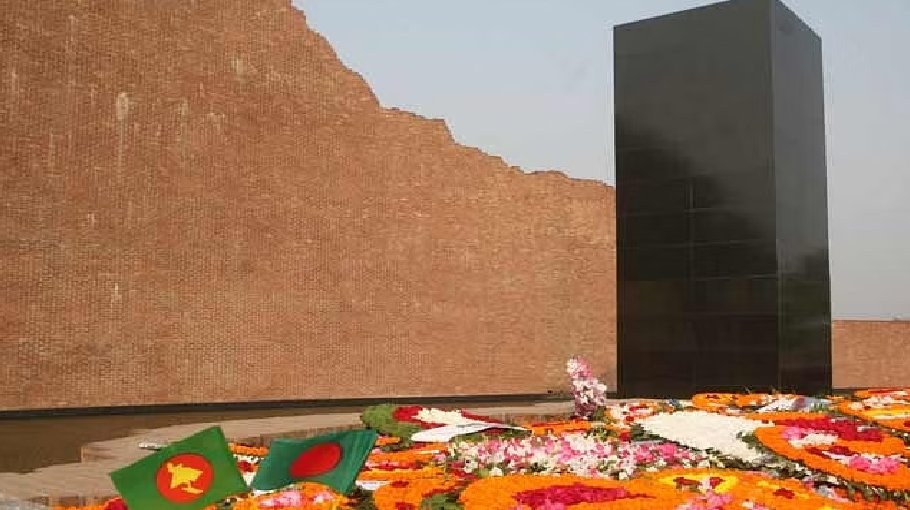Remembering martyred intellectuals

During the entire duration of the Bangladesh Liberation War of 1971, a large number of teachers, doctors, engineers, poets and writers were systematically massacred by the Pakistan Army and their local collaborators, most notably the alleged Islamist militia groups of Al-Badr and Al-Shams belonging to Jamaat-e-Islami like grievous manslayers. The largest number of assassinations took place on 14 December 1971, only two days before the surrender of the Pakistan Army to the joint forces of the Indian army and Mukti Bahini.
On the night of 14 December 1971, over 200 intellectuals of the-then East Pakistan, including professors, journalists, doctors, artists, engineers, and writers were rounded up in Dhaka. They were taken blindfolded to torture cells in Mirpur, Mohammadpur, Nakhalpara, Rajarbagh and other locations in different sections of the city. They were later executed en masse, most notably at Rayerbazar and Mirpur. In memory of the martyred intellectuals, 14 December is mourned in Bangladesh as Shaheed Buddhijibi Dibosh.
Even after the official ending of the war on 16 December, there were reports of hostile fire from the armed Pakistani soldiers and their collaborators. In one such incident, filmmaker Zahir Raihan was killed on 30 January 1972 in Mirpur by the armed Biharis of Mirpur.
Nine hundred and ninety-one teachers and professors, 49 doctors, 42 lawyers, 13 journalists, and 16 others (artistes, engineers, and non-journalistic writers) are estimated to have been killed.
Patriotism is an emotional attachment to a nation which an individual recognises as their homeland. Intellectualism denotes the use, development, and exercise of the intellect; the practice of being an intellectual; and the Life of the Mind. And the fallen great patriotic intellectuals in 1971 are the real life of our minds.
In the view of Socrates, intellectualism allows that “one will do what is right or best just as soon as one truly understands what is right or best”; that virtue is a purely intellectual matter, since virtue and knowledge are familial relatives, which a person accrues and improves with dedication to reason. Our fallen intellectuals could really fathom what was right or best for our people.
We never enter the time of remembrance without our mind being flooded with our martyred intellectuals. We cannot forget the heart-wrenching pain of their near and dear ones as they watched helplessly as the best sons of this soil were so brutally murdered in the second half of 1971 just before Bangladesh was liberated from the cruel clutches of the Pakistani military junta.
They went through a war of unsurpassed sacrifices by laying down their lives to the cause of creating the country, Bangladesh. When we put all the sufferings and deaths of every war together, these cannot touch the weight, suffering and sacrifice of their supreme sacrifices.
Their battle deserves their own recognition “lest we forget” and the world forgets. They as it is unconscionable to consider forgetting the sacrifice and death of our great intellectuals and civilian lives, it is even more so, a grave travesty and dishonour to their services and sacrifices, to forget. Today, we are speaking of our great patriots; our great intellectuals.
December 14 is the Martyred Intellectuals Day. It is an important day for us in Bangladesh. It is a day to give thanks, to pay tributes and to remember those who gave their lives during our glorious Liberation War in 1971 to protect our country. In reality, we should be thankful every single day of the year, but December 14 is the official day where we all come together to honour our fallen patriotic intellectuals.
The defeated cohorts of the Pakistani military knew very well that the most effective way of crippling the nation that was about to be born was to liquidate its best sons. So, some brilliant teachers of Dhaka University–where almost all the progressive movements in the history of the country had been initiated – were targeted.
The best way to pay homage to the martyrs is to make sincere efforts to translate their dreams into reality. They had a dream of a progressive and exploitation-free society where nobody would be discriminated against. Also, they were the torch-bearers of the spirit of Bengali nationalism that set the entire nation on a warpath in 1971 to win our freedom. So, let us live up to their expectations in perpetuity.
Let us not remember on a particular day only the men and women whose keenness of intellect and the power of conviction gave them a very special place in society. The day of remembrance should always be a part of our consciousness and existence.
A full-scale special tribute for the brave and gallant is to be performed by us on the Mourning Day for the fallen martyrs because they marked the most decisive battles of the entire nine-month long journey of Independence War in 1971. In that period, slowly broke down the Pakistani forces’ resistance and ultimately into a full surrender.
They were like shining stars of strength and loving devotion that many of us will continue to be guided by throughout our lives. Our love is deeper than the solar system and wider than eternity. Let us never forget that it is “love that shines brighter than the morning sun.
We should vow not to stop our fighting till the last butcher is perished from our sacred land. We must destroy their financial base and confiscate their properties to compensate the same to the families of war victims.
One hundred and ninety-five war criminals of the Pakistani army shall be tried in the International Crimes’ Tribunal to award due punishment to these perpetrators to let the whole world know of what magnitude of crimes they had committed to our people during our glorious Liberation War in 1971.The martyrs will thus live on through the love in our hearts.
Anwar A. Khan is an independent political analyst who writes on politics, political and human-centred figures, current and international affairs



